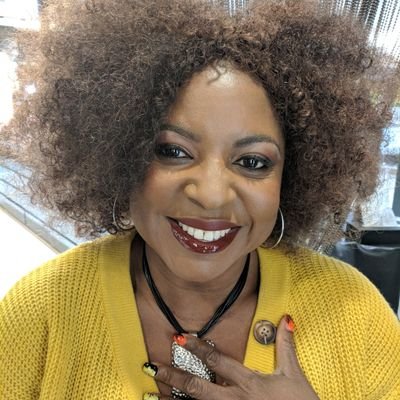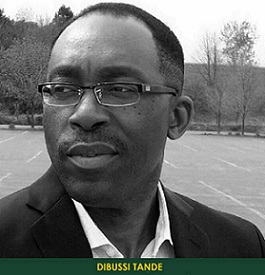Dibussi Tande: ‘Future generations should not suffer from Collective Forgetting’
DIBUSSI TANDE is a Cameroonian writer and poet, who alongside Joyce Ashuntantang, has recently edited a poetry anthology on the ongoing war in Cameroon. The anthology, titled Bearing Witness: Poems from a Land in Turmoil, is a poetic response to the devastating Anglophone conflict in Cameroon. It is a guidepost of collective memory which has gathered 73 poets from different backgrounds.
In this interview, Dibussi Tande tells us more about this huge project that seeks to bear witness to the suffering, despair and hopes of individuals caught up in, and impacted by the war in Cameroon regardless of their origins.
Can you tell us how this thrilling project took shape? How did it gain traction?
Well, as early as 2017, Joyce Ashuntantang and I noticed an emerging trend on social media platforms; many people were sharing poems, short stories and eyewitness accounts, among other things, about the “Anglophone Crisis” as its was commonly referred to back then. We separately concluded that it would be a great idea to compile and publish these very diverse writings, which portrayed the crisis in all its complexity, in a single volume. When we eventually realized that we were both nursing the same idea, we decided to transform that idea into reality. Going from idea to execution was not a difficult task for us because back in 2008, we had co-edited our first poetry anthology, “Their Champagne Party Will End,” in honor of Bate Besong, the venerated Anglophone playwright who died in March 2007.
We agreed that we would publish a four-part anthology focusing on poetry, short stories, creative nonfiction and art (paintings, photography, and digital art). Since we did not have background in art, we reached out to Afro-Expressionist artist, Adjani Okpu-Egbe, who incidentally just won the inaugural Ritzau Art Prize in New York, to serve as a co-editor.
In January 2019, we launched the first call for submissions on social media, in the press in Cameroon and by word of mouth. The initial submission deadline was March 2019, but we extended it to May 2019 to accommodate stragglers and others who learned about the project late. We did not receive any submissions on art and photography, so Joyce and I continued as co-editors. And the rest is history.

What was the most challenging part of making this project a reality?
There was a series of challenges. First, we received many more submissions than we could reasonably accommodate in a single volume. Deciding which poems to include or leave out was a very difficult and sometimes gut-wrenching decision because, in most instances, the poems that we left out were not necessarily bad; we just didn’t have the space for them.
The next challenge was editing the selected poems while trying to stay true to the original spirit, style and message of the poets. In some cases, the changes were relatively minor and did not require any additional input from the authors. In other cases, however, we worked extensively with the authors to refine their poems. However, once we got past the editing, it was a very exhilarating process.
It is worth noting that working for close to two years on these poems that told stories of alienation, despair, displacement, loss, nostalgia, trauma, anger, etc., took an emotional toll. However, this was partially offset by poems that were hopeful despite the bleak situation on “Ground Zero.” This is why we dedicated the anthology to the children of “this beautiful land in turmoil where dreams of a better tomorrow still abound.”
Why was it important to edit and publish a collection of writings on the Anglophone crisis? Do you expect any impact of the anthology on the ongoing situation in Cameroon?
Poetry is the past, poetry is the present, poetry is the future; poetry is identity, poetry is culture, poetry is memory—collective memory. And the poet is the chronicler weaving all these strands together into a coherent whole. In the opening lines of the anthology, we state that: “To write is to confront, To write is to remember, To write is to resist, To write is to testify, To write is to heal.” Thus, it was important for us to tell the story of the Anglophone crisis as it unfolded, not just for purposes of memory but also as part of a healing process. We are telling our story in our own words, in our own style, from our own perspective and on our own time! This time around, the lion did not wait for the hunter to tell its own story!
The anthology may not resolve the crisis or even bring the warring parties close to common ground, but these poems will help shine the spotlight on this “forgotten” or “unseen” conflict, as well as provide catharsis to its victims and serve as a collective guidepost for future generations.
Do you think some readers will feel side-lined given that the anthology is exclusively in English?
I am sure some will feel left out because they don’t understand English. That is to be expected. But we have certainly not side-lined anyone. This is an anthology that focuses on a conflict taking place within a specific territory – a territory that has borne the full brunt of the war in the last four years with thousands dead, over half a million displaced and hundreds of communities destroyed. It was therefore vital to give the people of this territory a platform to tell their story in the language they are most comfortable with. That is not too much to ask.
That said, this is an inclusive anthology that includes contributions from Francophone Cameroonians like yourself. Others who come to mind include Rose Ndengue, Geraldin Mpesse, Nelson Kamkuimo and Raoul Djimeli who has one of my favorite lines in the anthology: « La république sera sauvée/ Mais qu’est-ce que la république des fantômes » (The republic will be saved/ But of what use is a republic of ghosts).
How will the publisher ensure the distribution of the book within the country, particularly in the Anglophone regions?
As you know, the work is published in the United States and is already available on Amazon. However, given the poor state of the book distribution network in Cameroon, it is a challenge making the book available in Cameroon. The situation has been further complicated by the pandemic that has halted all travelling to and from Cameroon. Nonetheless, the publisher has a plan to ensure that the book is available in Cameroon once things go back to normal. We will keep our readers updated through our Facebook page and other channels.

Joyce Ashuntantang
Why was it important to start with poetry given that the call for submission included other genres?
As I mentioned earlier, our initial call for submission was for four different literary and artistic genres. We underestimated public enthusiasm for the project and ended up with over 200 poems from about 100 poets. So, we decided it would be best to publish separate volumes for each genre. We started off with poetry because it had the most diverse and largest number of submissions. We did not get any submissions for the art category so we dropped it, however, we might incorporate artwork into the fiction and nonfiction anthologies if there are artists out there who’re interested in the project.
What is the next step after this first volume?
We will spend the rest of the Summer promoting the poetry anthology as best as we can, given the restraints imposed by the pandemic. We were scheduled to officially launch the volume at the 46th African Literature Association (ALA) annual conference in Washington DC in May, but the conference was cancelled due to the coronavirus. We are considering organizing a virtual book launch with the editors and contributing poets.
And then sometime in August/September, will relaunch the call for submission, this time for the fiction and nonfiction anthologies.
So, we will continue our modest role of chroniclers of the conflict to ensure that future generations never suffer from “Collective Forgetting.”
Some people believe that this conflict has its roots in our common history while others believe that it is due to bad governance. How do you, as an English-speaking writer and intellectual, see this war?
Without doubt, the current crisis is rooted in history, in Cameroon’s triple colonial heritage. This is a topic that we discuss in some detail in the Introduction of the anthology. That said, the problems that we’re confronting today are really a direct result of a botched decolonization of the British Southern Cameroons and subsequent attempts by successive Cameroonian governments to strip the people of that territory of their identity and autonomy—from the early days of “reunification” in 1961 to the dismantling of the federal system in 1972. The establishment of a highly centralized unitary system in 1972 obliterated all constitutional provisions and institutions that protected West Cameroon from the socio-political domination of the numerically superior East Cameroon. The unitary state therefore paved the way to the economic, cultural and political “marginalization” of Anglophones and it normalized the systemic assimilationist efforts by the government, particularly through repeated attempts to suppress the English language along with the legal and educational systems West of the Mungo.
This, in the simplest terms, is the origin of what used to be referred to as the “Anglophone Problem,” which became the “Anglophone Crisis” in 2016 and eventually morphed into the current Ambazonian conflict.
Yes, “bad governance” is a very legitimate issue, in fact, it is a scourge, in Cameroon. However, the ongoing conflict is specifically rooted in the systemic inability or unwillingness of the state to respect Cameroon’s historic diversity, coupled with its obsession to assimilate Anglophones into a predominantly francophone system and way of life. This was never about selecting the best of both worlds, but about imposing one world on the other. The “francophonization” that Anglophone lawyers and teachers complained about in 2016 and the “marginalization” that led to the birth of “Anglophone nationalism” back in the 1990s have their roots in the colossal failure of the Cameroonian state to manage that much talked-about “dual heritage.” Simply put, the Cameroonian attempt to promote “le vivre ensemble” by decree (the pen) and by force (the gun) has failed spectacularly particularly with regards to the former British Southern Cameroons!
Thank you Dibussi Tande!
It’s been a pleasure talking with you!
Thank you for giving me this platform to discuss our ground-breaking anthology and introduce it to your readers. By the way, I discovered Clijec Mag’ just last year and I have been an avid reader since then. It is always a pleasure to discover a new literary personality from Cameroon or elsewhere whenever I visit your website. Keep up the good work and continue building bridges across communities and countries!
Source: NJIPENDI Daouda / ClijecMag’

